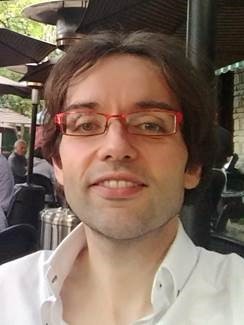Tensor-low rank models for reinforcement learning
Abstract: Reinforcement Learning (RL) has emerged as a promising paradigm for addressing sequential optimization problems when the dynamics of the underlying systems are unknown. The primary objective in RL is to learn a policy that maximizes expected future rewards, or value functions. This is typically achieved through learning the optimal value functions or, alternatively, the optimal policy. The performance of RL algorithms is often limited by the choice of models used, which strongly depends on the specific problem. However, a common feature of many RL problems is that the optimal value functions and policies tend to be low rank. Motivated by this observation, this talk explores low-rank modeling as a general tool for RL problems. Specifically, we demonstrate how low-rank matrix and tensor models can approximate both value functions and policies. Additionally, we show how low-rank models can be applied to alternative setups, such as multi-task RL. This approach results in parsimonious algorithms that balance the rapid convergence of simple linear models with the high reward potential of neural networks.
Date and Time
Location
Hosts
Registration
-
 Add Event to Calendar
Add Event to Calendar
- Rice University
- 6100 Main Street
- Houston, Texas
- United States 77005
- Building: Duncan Hall
- Room Number: Room 1064
- Contact Event Hosts
-
Prof. Joseph Cavallaro, cavallar@rice.edu
- Co-sponsored by Rice University ECE Department Seminar
Speakers
Antonio G. Marques of King Juan Carlos University
Tensor-low rank models for reinforcement learning
Abstract: Reinforcement Learning (RL) has emerged as a promising paradigm for addressing sequential optimization problems when the dynamics of the underlying systems are unknown. The primary objective in RL is to learn a policy that maximizes expected future rewards, or value functions. This is typically achieved through learning the optimal value functions or, alternatively, the optimal policy. The performance of RL algorithms is often limited by the choice of models used, which strongly depends on the specific problem. However, a common feature of many RL problems is that the optimal value functions and policies tend to be low rank. Motivated by this observation, this talk explores low-rank modeling as a general tool for RL problems. Specifically, we demonstrate how low-rank matrix and tensor models can approximate both value functions and policies. Additionally, we show how low-rank models can be applied to alternative setups, such as multi-task RL. This approach results in parsimonious algorithms that balance the rapid convergence of simple linear models with the high reward potential of neural networks.
Biography:
Bio: Dr. Antonio G. Marques received the Telecommunications Engineering degree and the Doctorate degree, both with highest honors, from Carlos III University of Madrid, Spain, in 2002 and 2007, respectively. In 2007, he became a faculty of the Department of Signal Theory and Communications, King Juan Carlos University, Madrid, Spain, where he currently develops his research and teaching activities as a full professor and director of the Data Science and Signal Processing for Networks research group. From 2005 to 2015, he held different visiting positions at the University of Minnesota, Minneapolis. In 2015, 2016 and 2017 he was a visitor scholar at the University of Pennsylvania, Philadelphia.
Dr. Marques’s current research focuses on signal processing, machine learning, data science and artificial intelligence over graphs, and nonlinear and stochastic optimization of wireless and transportation networks, areas where he has published more than 150 papers.
Dr. Marques has served the IEEE in a number of posts, including as an associate editor and the technical / general chair of different conferences. Currently, he is a Senior Area Editor of the IEEE Trans. on Signal Process., the Technical Chair of Asilomar 2024 and the General Co-Chair of CAMSAP 2025. His work has been awarded in several journals, conferences and workshops, with recent ones including the IEEE SPS IEEE Y.A. Best Paper Award 2020, and CIT 2021. He is the recipient of the “2020 EURASIP Early Career Award” and a member of IEEE, EURASIP and the ELLIS society.
Email:
Address:Department of Signal Theory and Communications, Camino del Molino s/n, Madrid, Spain, 28943
Agenda
Presentation at 4 to 5:00pm CST


